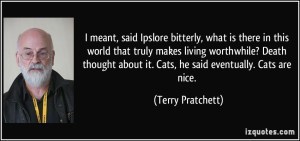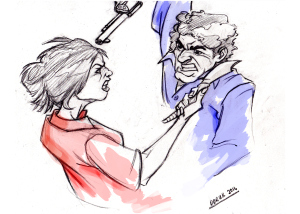R. Jean Mathieu's Blog, page 6
March 26, 2015
Heinlein’s Rules #1: Write.
There���s an apocryphal story attached to Abigail Adams, wife of the notoriously obnoxious and disliked second president, John Adams. She apparently chased (or, more likely, sent one of the children to chase) her husband as he was on his way to the Continental Congress in Philadelphia, to bring him his favorite pair of pants. ���Because most of the business of politics is applying the seat of them to the seat of the chair.���
She could easily have been Tabitha (or Stephen) King, Charmian London or Vera Nabokov for all that. Because the first business in writing is applying the seat of your pants to the seat of the chair.
You.
Must.
Produce.
Without a steady flow of new words, everything else dries up. It���s a slaughterhouse without incoming meat, an oil well without oil, a Congress without draft legislation. First and foremost, you must write.
Every writer is different ��� I tend to write in three-day bursts, plinking a few hundred words one day, a few hundred words the next, and hitting a streak of three or four thousand the third day. Jack London���s famous stint was 1000 words a day, Dean Wesley Smith writes in public, Bradbury wrote a short story a week, Kerouac wrote the entirety of On the Road in one forty-eight hour Benzedrine-fueled rush. To this day, Stephen King writes double what Jack London did and won���t let himself get up until he does.
Unless you���re going the Kerouac route, and I don���t recommend it, don���t wait for inspiration. Inspiration comes to you when you���re actually working, not when you���re playing another round of Civilization IV*. Talking about ���inspiration��� when you���re not writing is just another excuse for not writing. And having taken my share of long sabbaticals, you write better when you���re in a habit of writing. You get rusty otherwise. It���s just like anything else that way.
How much should you write? I���m going to talk of words per day, even though you may write in week-long or three-day terms like Bradbury or I. Don���t take Stephen King or Jack London or any other number out of thin air. You are not Stephen King. You are not Jack London. That���s like going to the gym and saying, ���well, I���ll lift a hundred pound weight every day. That���s a nice round number.���
Dean Wesley Smith recommends doing a time inventory once or twice a year, measuring how you spend all your time in fifteen minute chunks. I can attest that this is a useful exercise, and also a huge pain in the ass. It also becomes less useful if your life is less than completely predictable, say because you switch continents or because some weeks work furloughs you four days out of five and some weeks they call you in for twelve-hour shifts of unpaid overtime.
What I recommend is looking at the most stable parts of your week ��� maybe you never get called in on Tuesdays or you���re free after church on Sundays ��� and set that aside for a test run each week. This is the time where you sit down to crank out another few hundred or few thousand words. Start at a set time and end at a set time ��� slightly less than you���d want, so your brain considers the time precious.
When you���re done, divide the number of new words by the hours you���ve been writing. This is your words per hour, and it���s going to get more accurate each week until you know your average wordcount like the back of your hand. My own is about 800 words per hour.
Now, look at the upcoming week and see where you can reasonably slot in half an hour or an hour to write. Calculate how many words you can write this week given your wordcount and the time available. Halve this number, because shit happens.
This is your wordcount goal for the week.
You can extend this to monthly and yearly wordcount, if you like. And if you find yourself with an extra ten minutes by the word processor, see if you can wrap up that scene or write out a dialogue.
Once you have the time set out, you must protect it. You can do the caf�� thing, or stay at home. Do, however, remove yourself from the everyday in some way ��� even if it���s just moving the chair to a different part of the room. It helps you make a mental break from all the other bullshit in your life. I like to mount a framed picture of Jack London that I have, to spur me on.
Then turn off the internet.
No, you don���t need it for research ��� forge ahead as if you knew, and if it���s important (or if it���s encyclopedic information), drop ���[tk]��� in that spot to mark it to look up later when you���re editing. Writing time is for writing, that is, adding new words.
For years, I had a netbook that I���d gotten for free in exchange for showing up and looking white at a factory opening in China. I got what I paid for ��� it was so crippled that a month after I got it, all it could do was play music and operate Word. It was absolutely perfect, because while I was using that computer, all I could do was write. I got higher wordcounts per hour on that thing than on anything else, even on my regular computer with the internet turned off.
This year, I���m getting a Hemingwrite, because it���s designed to do the same thing, share documents via cloud, and survive anything short of a nuclear blast.
I also recommend taking two or five or ten minutes to reread a bit of what you���ve written (assuming you���re working on an ongoing project), not to edit, but to ���get into the voice��� as it were. I wrote ���Sweat and White Cotton��� with a very different voice from ���Preta��� and rereading a bit ���primes the pump.��� It also helps me to outline the next scene or two, at least in a rough one or two sentence sketch, before I start. This and the front matter where I describe the plot as if telling the story to the friend I call the scaffolding, because it���s supposed to come down before I send it around to the first readers.
What are you waiting for? Get the seat of your pants in the seat of the chair. There���s writing to be done.
—
*I CAN QUIT ANY TIME I WANT I SWEAR JUST ONE MORE TURN

March 19, 2015
Heinlein’s Rules of Writing: Introduction
This is a story of how to succeed as a writer.
I started writing when I could form coherent words on a typewriter. Ensconced in some damp box in a decrepit trailer on my mother���s property is a one-page detective story I ripped off from Gonzo on Muppet Babies*����� the earliest story I can remember writing, on Mother���s Selectric.
My writing career, in terms of getting things out, starts in 1998 ��� when I first sent ���The Remedy��� out to Asimov���s Science Fiction. They rejected it, but a year later the Ray Bradbury Contest gave it third place and published it in the annual anthology. Waukegan Library sent me a copy of Yestermorrow signed by Bradbury himself, something I still deeply treasure. That same year, I published my first ���zine, Rocket Takeoff, starting my love-hate relationship with the publishing world.
In those days, you mailed yourself a copy of the story through the mail for a poor man���s copyright, and mailed another copy to the magazine so you could wait six months or a year for your rejection. Asimov���s was so notoriously behind the times that in 1998 the guidelines included the words ���please remove the sides of the paper before submission,��� a phrase I struggled with until I remembered the old dot-matrix printers that I hadn���t seen since ���93. You published anything by either coding an HTML website from scratch or by running copies off at Staples and then staying up all night stapling them together.
The market for SF short fiction was tiny then, because the explosion of online and otherwise Internet-enabled new markets, like Daily Science Fiction, Escape Pod, or anthologies like Blood on the Floor, had yet to happen. By 2001, I had a list of six markets that paid money, which I���d pulled together from checking the Barnes & Noble racks and copying out of the library���s Writer���s Digest.
Six. Total.
Submitting a story to those six markets and collecting rejections would have taken three and a half years, according to the nascent response-time information available at websites like Writer���s Black Hole. I don���t have records from that time any more, so I can���t tell you if I actually shipped one story to all six or not. I did write ���Gods of War��� and got Honorable Mention in the Cuesta Literary Contest. I flew off to China for a year, and came back.
There were more markets and more opportunities and more information. Duotrope���s Digest had started up, aggregating response-time, payment, and guideline information, and keeping track of which markets were still able to pay. I sold ���Gods of War��� to MindFlights.com**, sold a few other pieces, and kept on writing. But it was always starting, never finishing (a bit like everything else in my life during the three years wandering in the wilderness). After ���Gods of War,��� nothing seemed to sell, and ���Gods��� was just sitting there useless on my hard drive, spent.
I went back to China to finish my degree, and made the acquaintance of Paul Skelding. He was big on new publishing ��� Amanda Palmer and ���the death of traditional publishers��� were always on his lips. He introduced me to Smashwords and the concept of selling e-books. He and I concocted an online magazine together that spectacularly failed to sell, before he got married and was transferred north to Beijing.
I despaired, at that point. I���d dropped an old story from 2007 or thereabouts into One Weird Idea, one that had failed to sell, because I had literally not finished anything since. I was exiled from China and spent six weeks meandering around Hong Kong, living out of a matchbox in the Chungking Mansions and alternating between drifting up and down the Kowloon shore and sipping cheap spice coffee in the internet caf��/hat shop on the first floor. I admitted that One Weird Idea was a failure, and looked at my career to that point. I felt that if SF/F wasn���t spent, I at least was. I plinked at a few stories, both in America and once I���d fast-talked my way back into China, but the spirit was gone.
In December of 2012, when the world failed to end, I discovered Dean Wesley Smith. Specifically, I discovered The New World of Publishing and Think Like a Publisher. Dean doesn���t peddle get-famous-quick or false-hope stories. He praises Amanda Hocking���s grit and her good luck, but doesn���t consider her a pattern to replicate. He laid out the numbers and showed a way to make a living as a writer. Not get rich quick ��� make a living.
I was inspired. The various starts I had going all the way back to 2008 started getting finished, things like ���Home for the Holidays��� and ���The Short, Strange Life of Comrade Lin��� and ���Simplified���. I checked the anthology lists, and cranked out pieces like ���Bartleby the Clerk��� and ���Wives are Waiting by the Bank or������ and ���The Diction-fairy��� for them. I revived the moribund company structure I���d started on my last visit home, dusted it off and made it my publishing house. I put up stories on Smashwords and Amazon, I worked on the blog, I put together a business plan and marketing. I finished my first proper novel, No Time, for 2013���s National Novel Writing Month.
Lachlan Atcliffe commented, at the time, ���whatever or whoever you���re doing, keep doing it.���
Most importantly, I sat down to write and I kept writing. Dean Wesley Smith incorporated workflow analysis and production goals. Jack London called it his stint and took to it with the same grim determination he used to haul line or shovel coal. But Robert Heinlein formulated probably the most perfect, crystalline version of the process. These are Heinlein���s rules:
Write.
Finish what you start.
Do not rewrite except on an editor���s orders.
Put the story in the mail.
Keep it in the mail until it sells.
It was true for Jack London and Bob Heinlein, it was true for Dean Wesley Smith, it���s true for me and it���s true for you. In traditional blogging style, I���ll be treating all five of these individually over the next few weeks���and presumptuously adding one of my own. But, really, if you sit quietly with Heinlein���s rules and live by them, you, too, will succeed as a writer. It���s not easy. Nobody said it was easy. But it is that simple.
—
* To be fair, I also ripped off��Tiny Toons: How I Spent my Summer Vacation��for some bits.
** Yeah, I sold an overtly Buddhist short story to a Christian lit magazine. I was as confused as you are.

March 12, 2015
Rest in Peace, Sir Terry
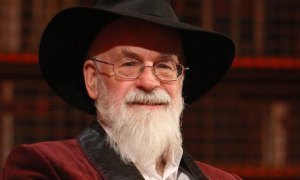
A moment of silence for Sir Terry Pratchett, who taught us not to fear Death. Go read his last story.
When I was a teenager, I absolutely loved Les Miserables. I read a condensed version of the book when I was fourteen, heard the musical for the first time at sixteen, saw the play for my eighteenth birthday, and read the full version between seventeen and nineteen. I read the full version in the original French during my first year in China, when I was twenty.
When I was seventeen, my friend James Chen told me about a book called Night Watch. It was a fantasy send-up of Les Mis, he said. And that was the first time I ever read Terry Pratchett. To this day, Night Watch is probably my favorite of the Discworld books (because I like humor, time travel, and French revolutions).
I kept reading, mostly as I could pick up books through the library or used bookstores. I read Men at Arms and didn���t get it, I read Guards, Guards! and did. I loved Jingo and Hogfather and Mort.
But most of all, besides Night Watch, I love Small Gods.
I picked up Small Gods in the oldest bookstore in Hong Kong, during my six-week exile in the summer and fall of 2011. Small Gods is ���different. Sir Terry loved clever protagonists, brilliant but unappreciated people, usually cynical (Mort, Sam Vimes, Susan, Moist). Brutha is the exact�� opposite. Brutha is simple in ways that not even Carrot is simple. He���s an uncomplicated believer in Om who happens to have a perfect memory. His belief and his simplicity power the entire story.
I like Small Gods because it talks about the power of belief, of how institutions corrupt, of what kind of man Brutha is and what kind of man Vorbis is, and what they represent for religion, power, and institutions. But I love it because Sir Terry so obviously wasn���t Brutha, and wanted to write him anyway. Because Sir Terry struggled to write this protagonist who was so unlike his other protagonists and so unlike himself. And he succeeded.
Goodnight, Sir Terry. I hope Death said ���thank you��� for making him less scary to the rest of us.

March 8, 2015
Go Ride the Music
Do you see the music?
When I listen to certain songs, they always summon strong, clear images or fantasies. Sometimes it has to do with the music video or where I first heard it���but often not. For example, London Symphony Orchestra���s cover of ���Smooth Criminal��� sounds to me like the Nazis marching into Paris, kicking down doors and clearing out undesirables. Here are some of the others:
Redskunk Jipzee Swing Band���s ���Arctic Blue���: A John Constantine figure, selling his soul to Hell to save a woman���s life. He knows exactly what he���s buying, and he knows he���s damned anyway. According to Molly Reeves, she saw similar imagery while they were composing the song���even though the lyrics have nothing to do with it.
Blue Oyster Cult���s ���Don���t Fear the Reaper���: The Battle of Teutoborg Forest, gone very, very wrong. Something dark and amorphous has swallowed the Germans, and the lonely Roman legion is in the middle of the darkness, around a feeble lantern. A black rain that should not be falls from the sky, staining faces and dulling armor. Shadows mass to swarm and attack out of the darkness, to douse the light. The one lantern may be the only light left in the world. The Romans are almost certain to die. But they are going to defend that flicker of flame, because every moment it remains alight is a victory.
Bob Dylan���s original ���All Along the Watchtower���: A companion-piece to ���Don���t Fear the Reaper.��� The night before the Chinese Battle of Red Cliffs, where Zhuge Liang performs a grand Taoist ceremony for fair weather.
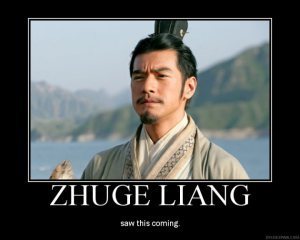
Bet you thought I forgot about these!
It���s debatable whether he had the whole three-day ceremony set up because he knew the winds would change in his favor in that time, or whether his ceremony actually changed the weather���but in this case, black rain falls. I see the man with the wispy beard look up in horror, because this is not of the Tao. Thunder strikes, and a lightning made of darkness destroys the altar. There is scattering and chaos as blackness seeps into the world���
Kongos��� ���Come With Me Now���: Specifically, the accordion piece at the beginning. I always picture a massive Mayan god, done in the traditional artistic look, rolling back and forth with his face always forward and chuckling like a 90s video game boss. The rest of the song descends into chaotic postmodern fistfighting. As it should be, really.
Neil Young���s ���Ohio���: The Stand. All of it. Mostly Stuart Redman, admittedly, and his trip back to Boulder with Tom Cullen, mixed in with the four messengers of Mother Abigail making their way west to Las Vegas and the confrontation, earlier in the book, with the Menagerie. Tired, dusty men on the road through the vast flat West.
Those are some of the strongest images I get from music. How about you? Do you see visions when you listen to certain songs? If so, what are they?

February 25, 2015
How “No Time” Happened, Part 3
Due to overwhelming fan demand…
…that is to say, two people…
…here is the original outline document for��No Time: The First Hour. I have a similar one for��No Time for the Killing Floor: The Second Hour��and have started the one for��No Time for Revolving Doors: The Third Hour.
Obviously, SPOILERS AHOY!
Symbols: The hours, will (power, to power, free, etc.), countdowns, dancing (time), que sera sera,
Suspects:
Will (predestination paradox motive! Never seen that before, have ya?)
Rachel (revenge for cheating on her with Maria)
Maria (jealousy over Rachel/deeper motives)
Suspect X (revenge for Gooch putting him away)��[Obviously this is Hank Lightfoot.]
Rachel���s sister (crime of passion, revenge for ���beating��� Rachel)
Angelo (prevent Gabriel from telling something Gabriel doesn���t even know yet. He���s intentionally ignorant of whether Gabriel ever tells, and unintentionally ignorant of when Gabriel hears.)��[ed. note: This character’s name was changed to Hector Descanso at the last minute.]Chapters 1-2 (~30-35 pages)
Gabriel wakes up
Will skips Gabriel Up to the morning after, to find the body
Will can���t slipshank [this is a term from Continuum for what in the book is called a Bill-and-Ted], Gabriel���s rattled and thinks it���s because they���re approaching a nexus
Gabriel says to himself ���obviously a crime of passion.��� But what kind? Will says ���think of the people you know. You can���t make a new enemy in two days, can you?���
Why doesn���t Gooch span down to the moment of the murder? By the time he can, he ���knows��� that only his elder and the murderer are present?
Morgan and Belicec [Matthew Park]��visit Gabriel, and show him the murder weapon ��� Rachel���s scarf. Will brought it to Morgan.
Morgan: ���It���s your wife.��� (you two argue loudly in about two days, just before the murder���) ���Impossible!���
Belicec: ���X (a Time Master��follower Gabriel caught, the one preying on Rachel���s sister) is loose.���
Other suspects?Chapter 3 (~17 pages)
Gabriel goes to the M.B. (or SLO?) Corner to grapevine��the time-active��suspects.
Wrex: ���Your wife does kill a time-active by strangulation.��� (it���s just ��� in her Yet a bit. Gabriel will later punch this guy in the face for pulling a Further Information.)
���Angelo Foreshadow���s been lookin��� for ya.���
In exchange for info, Gooch is handed responsibility of Maria, the amnesiac on their step. Charged with taking care of her and investigating what led up to her being there, and returning her home.
���Go Down and see for yourself. You were there.���
Maria freaks out at skipping but can do it herself. (some tension since she has none of the Legion���s usual post-hypnotic triggers)Chapter 4-5 (~30-35 pages)
Enough room for two or three major events. Use ���em well.
Gooch suspects Landreth [another name for Hank Lightfoot], then his wife.
Other suspects come into play���partly so that Gabriel can avoid thinking it���s his wife. Including Will (acting shifty? No motive to be pinned). And Maria (jealousy). And Rachel���s sister (crime of passion/revenge for Rachel).
Angelo Foreshadow disappears (Gooch speaks to Jessica, there���s this whole huge hole in Angelo Foreshadow���s worldline���).
Morgan: ���Date���s been set for punishing your wife for your murder.��� (end Ch. 4)
(Ch. 5) The time-active grapevine��start turning up leads: X was elsewhere at the time, Angelo���s come Down and is looking for Gabriel, info on Maria? ���And hey, your sister in law was asking around about you…she seems pissed…���
While investigating Maria, eliminates her but spooks Will a little. (���I���m going to surveil your place and see if she shows up.��� He does. Why would Will lie? Because he was the murderer or hiding him. But this makes no sense!)Chapter 6 (~17 pages) (what���s the Big Middle?)
Gooch and Rachel ��� their relationship, how they got together, the Thing that haunts him.
Gooch sends Belicec (Will?) Up with some physical evidence and sneak superior forensics in.
Gabriel investigates Maria���s past��(events after she wakes up on the beach), saves Maria from attack? She lionizes him.Chapters 7-8 (~30-35 pages)
Will met himself��recently. Why? (how does Gooch find out? Something to do with Maria investigation. Or Anna tells him. Now Will is really scared, and showing it.)
Maria and Rachel have met (did Rachel see them together?) (Rachel gave directions?)
���meanings of act 1 revealed��� ��� Rachel���s sister confronts Gabriel, he laughs in her face at the very idea that he could beat his 6���5, brick-shithouse wife. Angelo tries to evince the info out of Gabriel, and realizes he���s too soon when Gooch is clearly confused.
Forensics comes back, returns the scarf to Gabriel.
The (original) scarf goes missing.Chapter 9 (~17 pages)
Gooch makes all the phone calls. This is the last, critical clue, because it���s when Will must have made his move.
Gabriel assembles people���s Ages, reviews with Maria. ���I usually do this alone, but������
���It can���t be���but it must have been Rachel.���
How is Rachel finally eliminated? Maria���s suggestion. What?
Gabriel works it out: Will couldn���t slipshank. At the time, Gooch thought it was an approaching nexus. Now he knows it wasn���t, since everyone else���s slipshanking is fine. Which means that it must have been Will or a leveler, since the scarf was never returned, and all the mundanes have been eliminated.Chapter 10 (~17 pages)
Rachel is clearly sitting on something and about to explode/skirmishing.
Gooch looks for positive proof, goes out to get it, drags Maria along. What���s the proof?
Maria tries to seduce Gooch?
Gooch sends Maria home.Chapter 11 (~17 pages)
The rugby game.
The Caballeros drink and argue in public.
���and Gooch extends the olive branch. Rachel accepts. In private. They break the bed.
Gabriel leaves a note. In case he doesn���t come back.Chapter 12 (~17 pages)
Gooch goes and tells Morgan what happened.
Gooch goes for his walk on the beach, is confronted by Will.
Gooch tells him to stay there, he knows what happened. Will at first denies, then Gooch explains it.
Will jumps Gooch, Gooch slipshanked a knife and wounds Will while he���s got the scarf around Gooch���s neck.
Will, losing blood, spans away when he thinks Gooch���s dead.Chapter 13 (~17 pages)
Gooch wakes up, very surprised. Maria is waiting there, with a bundle. Thanks Gabriel for what he did, and is returning the favor. She shows him the bundle, it���s his body. He thinks it���s his elder, Maria invites him to investigate. It���s his joven what the he-. Threatens Maria. Maria points out that there is a body on the beach the next morning, it can either be this one���or yours. Gooch concludes he has just been viciously, viciously fucked over. Maria says ���toodles!��� and spans away. Gooch grits his teeth, arranges the body.
Gooch walks home and confronts the posse assembled to do in his wife by time traveler justice, tells them to go the fuck home. Confirms with Morgan that Will���s been apprehended and brought to justice.
They all conclude that Gabriel is living on Borrowed Time, tisk and shy away a little.
Gooch falls into bed with his loving wife, worried that he���ll be dissonenced��the next time he spans.

Happy Clam Chowder Day!
Today���s post is a bonus, coming a day early to celebrate America���s National Clam Chowder Day.

God damn but that is beautiful. Just…look at that.
Seriously, next time someone gives you shit about how Americans have no indigenous culture/cuisine? Clam chowder. It was the canny adaptation of a centuries-old French and English communal dish (something akin to cioppino) to the bountiful shellfish fisheries of the Atlantic seaboard. The only proper chowder, white and creamy, is made with clams, potatoes, onions, sometimes a green vegetable like celery, and milk.* It���s garnished with oyster crackers, the modern descendant of the ship���s hardtack used to thicken the chowder (rather than flour) in the first place.
Where I���m from, Morro Bay, chowder is on literally every menu but Taco Bell���s. When I was growing up, soup options were Soup du Jour and Clam Chowder, and every restaurant has ���the best clam chowder in town.��� My first job, washing dishes, included ���bottomless bowl of chowder��� as an employment benefit. Can���t imagine why.
[picture of waterfront ��� ���This may have something to do with it.���]

This may conceivably have something to do with it. That and the estuary making the place an ideal habitat for bottom-feeding filtration mollusks.
When I got to China, I discovered that not only did they not have clam chowder, nobody had ever heard of it. Not even the other gwailo. Being as how fish and shellfish were freely available fresh (as in, ���alive���) in the wet markets and I was in desperate need of American food, I turned to my friend Old Scrote (who���s taught me so much) and adapted his recipe. Here, then, is my recipe for Chinese clam chowder.
First, go down to the wet market and argue with the fishwife in Cantonese.

This one, around the corner from your apartment. You can go inside if it’s raining.
Mind the blood groove in the floor, you do not want to fall in that shit. You���ll want a bunch of clams, mussels or oysters, and maybe a fish if you can get her to kill it and throw it in for less than ten kuai extra. Because of my terminal lack of fucks to give and usually dodgy employment situation, I didn���t ever have them shucked but just tossed them into the chowder, shells and all.
Go over to the vegetable ladies and pick up onions, potatoes, and celery. Everything I ever cook is ���one quarter onion per person per meal,��� and you���ll want double that amount in potatoes and two celery ribs for each onion.
Head to the grocery store for the bacon and milk. Only use milk that you can make cheese with by boiling, adding salt and vinegar, and straining. If the milk doesn���t make cheese, it shouldn���t go in your body.
When you get home, chop the celery up into half-inch lengths and the potatoes into thin slices. As Old Scrote instructs, ���Chop the bacon pieces very finely and fry them in a little oil. Chop the onion and soften it with the bacon.��� Where we diverge is the next step ��� toss the clams in, liquid and all, adding water if necessary, then cover the cooking pot. Don���t turn it up too high ��� you want the liquid to simmer but not boil. It shouldn���t take but a few minutes, five or ten at the most. Remove the clams and set them aside, tossing out any that refused to open. You do not want to eat them.
The rest of the recipe proceeds like Scrote ��� throw in the potato slices, turn up the heat, and boil them. After about ten or fifteen minutes, toss the celery in, too. Add the milk after twenty minutes, then wait for the potatoes to crumble into flour and thicken the soup up. Add the clams back in and season with plenty of salt and pepper to taste.
Serve with Tsingtao beer and a side of homemade sourdough. Feed yourself and your two insane roommates and whatever friends/lovers come streaming through the house for a week or so.
Happy National Clam Chowder Day.
—
*I had heard legends of this ���red��� chowder, mostly from a throwaway gag in Ace Ventura, but I didn���t really believe it existed. Then, when I was 22, I was finally served some. It made me doubt the existence of a just and loving God.

February 19, 2015
How “No Time” Happened, Part 2
In August of 2013, I flew back to America to sit the mandatory French testing that would guarantee me a placement in the Peace Corps. I���d worked on an organic farm outside of Shenzhen, China, and with proof of my French skills, they were certain to ship me off to some distant clime in West Africa. While I was home, I scoped out locations and soaked up the atmosphere of Morro Bay, a place I hadn���t seen in two years. I hashed a bit at my outline, in between visits with old friends, meals that involved cheese and good beer, and endless games of Europa Universalis III.
A month later, in September, I flew back to China, flush with success. I started a new semester at Northeastern University���s online program and hit the bricks, looking for work. I knew the schools had hired while I was an ocean away, but that just meant more tutoring opportunities, right?
���right?
A month later, I was still hitting the streets. China���s National Day had come on October 1, a weeklong vacation where, as with every Chinese holiday, the students go home to their parents, sleep, eat mama���s cooking, and sleep more. And eat. And sleep. Zhuhai, already a sleepy little seaside city, was sleepier still, soaked in its own turpitude.
It was during the holiday that my girlfriend broke up with me. Two and a half years come to an end. Looking back on it, it had been a long time coming. I���m glad she pulled the trigger – and I���m still glad she stood by me as long as she did. I said goodbye to her and cut our staycation short, walking home instead of taking the bus. It was four straight miles through the dark starry Zhuhai night, where the sea is slate-grey at noon and muddy brown at dusk, and the suspicious smell of the Pearl River���s effluvia poison the Pacific���but hell, at least the air���s clean enough to breathe.
I went home to the cavernous four-bedroom apartment that my roommate had fled months before, where we never did buy furniture and the kitchen always seemed in constant danger of being overwhelmed by some lifeform or another. It was a whitewashed tomb on the eighth storey, full of closed doors and regrets. My room and the kitchen were the only places that even seemed inhabited, and my room only because of the three luggages and the small collection of Tsingtao beer bottles I���d collected after each day���s job hunting.
The collection got bigger as October wore on. My internet gave out and never came back, the food in the fridge went bad as I dined, night after night, on a bottle of Tsingtao and two packets of Chinese peanuts. I began to take up residence in the local gwailo bar, an Authentic Australian Bar joined at the hip to a dodgy Italian restaurant, owned by a Welshman and staffed with the best English students the Zhuhai universities could provide. I ordered the garlic chicken at the extravagent price of ten dollars, and made four meals apiece out of it, washed down with copious amounts of the local swill beer that was priced just right at less than a dollar per pint. I did my homework over their wifi, perched on a rickety stool in the back and with my computer shoved in between the skittles table and the wall, ducking down if I saw my ex or any of her colleagues so I wouldn���t run the risk of embarrassing her.
My Hemingway impression was perfect.
I began, in a crude way, to figure out that I was destroying myself, and that unless something was done, my grades would suffer. Unless something changed. Unless I changed. Unless I did something���adventurous.
I signed up for National Novel Writing Month on October 20, my mother���s birthday. I shaved my beard on October 30. I had an ill-advised one night stand thanks to my Doctor Who costume on October 31.
On November 1, I nursed a hangover and opened a new word document. At the top, I typed NO TIME: THE FIRST HOUR. And I began to write.
I���d written a novella the previous year, a patchwork piece of five interconnected pulp stories entitled Ian Brown and the Hand of Fatima. But I���d never finished a full-length novel. National Novel Writing Month asks for 50,000 words. The 12-chapter mystery formula asked for 60,000. Well, Hell. I had no job and no girlfriend and my life consisted of online classwork, the pub, Sid Meier���s Civilization IV, green Tsingtao bottles, and my bed.
And now, a book. Gooch took shape immediately ��� I���d done preliminary work on him, Rachel and Maria a week before I started. I groped for Rachel���s voice and found it once I realized the person I thought she was was actually Debbie-Anne. Maria took her entrance and characters began to crawl out of the woodwork: Uncle Jerry (then under the pseudonym Uncle Wrex), Matthew Park, Alison Wingate III.
Francesca Caballero y Gutierrez, Ama, was a particular treat. Until Gooch opened that door, I was expecting the frail old woman from my notes. The woman who appeared on the page is still blind, but her fingers are strong and her ears sharp. Age didn���t diminish her ��� it refined her. And I fell in absolute love with her (still am!).
The soundtrack coalesced. Gooch���s ���Telegraph Road,��� Maria���s ���Heaven on Their Minds,��� the tick-tock of ���No Time��� and the spare acoustic eulogy of ���Beast.���
I remember finishing chapter four and talking to my mother on the phone and going ���I wrote this character who���s just like you!��� (Alison)
I remember writing chapter nine and calling her again and going ���I���m sorry. I���m so sorry. I didn���t plan this. Alison just ���kind of got away from me there.���
I remember spending almost a week on chapter eight, as it metastasized and threatened to strangle the book like a cancer. As it simply kept growing as fast as I kept writing, and of the sleep-deprived despair I felt at ever finishing the damn thing. I remember Lachlan Atcliffe steeling me to carry on and listening to my rants about how much I hated it.
No, seriously, fuck chapter eight.
I remember writing about Gooch���s love of tequila, inspiring Big Joel to suggest a round of tequilas. And another, and another. We whispered terrible secrets in the dark, the things that haunted us and drove us to that dingy bar, that distant continent, that fish-smelling village of Tangjia that had once shown so much promise.
There is a pervasive energy to the gwailo, a malaise and a shadow that hangs over us whenever two or more gather ��� the mingled love and fear of Home. In large cities, young cities, husky, brawling, where there are Russians and Frenchmen and Israelis thrown together with the usual detritus of the Anglosphere, where some are still young and still on their gap year, where there is still some hope, the malaise ebbs. In cities like Zhuhai, it���s in the air ��� the sense that you have failed at life at Home, and will fail again if you ever return, that are less than a man if male and an invisible white ghost if female. In Haikou, it was suffocating as the jungle odor of the coconut groves and the punishing wet heat of afternoon before the monsoons came, and just as real.
There was an Englishman who tried to pick a fight with Big Joel that night, but the old brawling hockey-playing Irish boy from south Boston wasn���t having it. He was quoting Robert Frost instead, as he might have done before a tabernacle or a Harvard lecture hall in another life. So, after the tequila conspired with darkness to rob me of memory, he started in on me. They tell me we wandered out together as the bars closed at two AM, spilling into the street market beneath the shadow of the legendary Dragon Union dance hall and brothel and bordello, that dominates the heart of Tangjia.
Praise be to China and the Chinese, for they make use of every public space. Any square inch will be turned to community garden, to ballroom dance practice in the evenings, to the housewives��� tai chi in the mornings under the care of the wizened master, or to the street market. Enterprising young guns from across China, from Urumqi and Kashgar on the old silk road where the men all wear silk hats under Allah to the waterside slums of Shenzhen, gather in the night markets to buy and sell. The card tables come out at sundown, the portable barbeques are trundled from their hiding places, the restaurants retreat inside themselves while the Muslim boys banter and grill you oysters and kebabs and crucified chicken drumsticks and the toothless Hokka women smile at your Mandarin as bad as theirs and grill or blanche vegetables and pork by the mouthful. We whites set up ourselves a card table, between two pointless street gangs and a quiet table of low-grade tong soldiers.
They tell me that the Englishman became mean as he drank, as Englishmen do, and he began to insult my mother. They tell me I took a swig of beer, and asked with all politesse if he was joking around, or if he was really trying to insult my mother. They tell me I put the bottle on the table, quite deliberately, as the other six guys shifted around, ready to start the fight if I threw the punch. Hell, I had a brown belt in Uechi-ryu and a Boston southie going for me.
And the Englishman sputtered that he was just joking around. And I smiled, and shook his hand, and was pleasant.
That���s the bit that scared people, the bit they were haunted by when they told me the next morning. I was scary because I was friendly.
Finally, by November 30, I had taken a spare room with a Grand Old Gentleman and a scholar, and stayed up all night, powered by homework and cheap Tsingtaos and Pepsi, and plowed inexorably through the last few chapters. I wrote them all in that night, finishing at 5:50, the time on Gooch���s microwave when he stumbles into his house on Easter morning. I scattered [tk]s like confetti, marking places to fix in the second draft or after, leaving them spread in my wake as I sailed on towards the safe harbor of the end, the end in sight, -THE END-.
And I reached The End.
The dawn was just yellowing, the sun peeking triumphantly out before the factories would bury it under smoke and soot. I put on Pink Floyd���s ���Comfortably Numb��� and brewed myself a cup of jasmine tea. I spent an hour like that, wandering the house, as my roommate wandered out for his coffee and out to teach his morning class. I let it steep into me, into my bones.
I���d written a book.
At 62,000 words, I���d written an entire novel.
I uploaded it to NaNoWriMo for verification, and got my winner���s diploma.
Then, spent, I stumbled to my room, and slept.
On December 1, I took the ferry to Hong Kong. It was time for my visa run…and a party to go to. One I had damn well earned the right to go to.
Strange and beautiful things happened then in Hong Kong, but then they always do. Hong Kong, for my money, is the most romantic city in the world. And I had written a book. God damn. I���d really done it.
The rest of the story is a roundy-round of drafts and edits, shifting names and nationalities, Alison and Jerry and Ama assuming their proper place and dignity, things explained, verisimilitude. The story of publishing a book is rarely as interesting as the story of writing it. But, hey, that���s the company motto: Every story has a story.
And I���d written a book.
God damn.
Edit: Big Joel died, not too long ago, in a freak car accident in the streets of Zhuhai. Wherever you are, raise a glass for him. Where he’s gone, everyone is a poet – and he can drink and quote Robert Frost in a night that never ends.

February 12, 2015
How “No Time” Happened
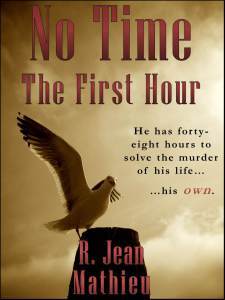
No Time: The First Hour
I covered this a little bit on the Acknowledgements page, but here���s the full, uncut version of how No Time: The First Hour��came about.
It started with Audrey Niffenegger, and started with The Time Traveler���s Wife. I grew up on Bill & Ted, Doc & Marty, the Doctor and time travel episodes of Star Trek same as anybody. Until Audrey came along, time travel in science fiction was conventionalized ��� an adventure plot, the danger of paradox, the terrible knowledge of the future. The most original development, arguably, was Bill and Ted���s most excellent insight that you can totally stuff your pockets with the things you really need once the adventure���s over! Excellent!
*air guitar*
But then Audrey turned it on its head ��� Henry DeTamble doesn���t interfere with historical events, because he���s locked in an eternist framework from which there is no escape. There���s one small paradox. Henry does plenty of running, stealing, and fighting, but that���s not the focus of the story. The focus is the strange relationship between Henry and Clare*���and time travel is a force that both brings them together and separates them. Time travel becomes a metaphor, not for history, cause and effect, or prophecy, but for the emotions inside a long-lasting relationship. It is an inexorable tragic force, like age and how people change once they���ve been together for years. Audrey didn���t approach her time-travel book like Star Trek or Back to the Future���she came at it completely differently.
And I started to see the possibilities. My tiny little mind started to crack open to the light.
Then I read the Continuum��RPG, and my mind fucking exploded.
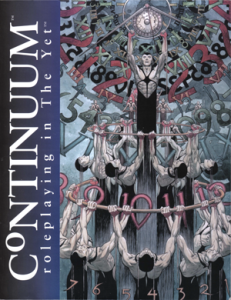
Guys? We’re the good guys, right? The bloody hands and crypto-fascism are making me start to think we might not be the good guys…
Continuum, the Aetherco RPG from the late 1990s, is the greatest time travel game you���ve never heard of. Like The Time Traveler���s Wife, Continuum assumes a perfectly eternist universe ��� where the Twin Towers are always falling, somewhen. And Continuum thinks through all its implications ��� you enter into a society of time travelers (spanners) locked into an eternal Time War that they know they���ve won, but know must be fought. It takes a degree in theoretical physics to effectively wield the Time Combat rules.
I���m not going to lie, Continuum was a big, big influence on the world and society of No Time. No Time basically started life as a reinterpretation of Continuum ��� specifically, one where the Continuum and the Narcissists are perfectly matched, a Temporal Cold War out of Star Trek rather than a chillingly prescient terrorist hunt.
Along the way, I started a story called Music Girl based on some ideas I read about adapting Michio Kaku���s work to tabletop RPGs. Kaku and scientists like him enjoy playing with the dimensionality of time, really digging into the concept of the fourth dimension. Things would look more comprehensible up there, the way two dimensional worlds (such as the figure above) make perfect sense as long as you���re looking in three dimensions. Three-dimensional shadows would be cast. You could have perfect hair, because your head is now a hypersphere.
I still have the physical printouts of all the fourth dimension notes I made for Music Girl. Scrawled along one page like Jack Torrence���s moonlighting as a ghostwriter for Philip K. Dick are the words ���LISA IS LISA-SHAPED LISA IS LISA-SHAPED LISA IS LISA-SHAPED.��� Because if I study enough fourth dimensional physics I become all Roscoe���s Not Here, Man.
So, while I was cheerfully filing the numbers off of Continuum, I realized that the only way to do a time travel story properly is to build it from the ground up. Like ���from the very laws of physics. How does time work? How do paradoxes work?
I wrote up a document that I am exceedingly smug about. It outlines how Gooch���s universe works. It���s an exceedingly elegant system���one very different from the rules that govern the Continuum. Superficially, the Eternists and the Continuum are similar. But all you have to do is scratch the surface and keep your eyes open…and, as Will Howe could tell you, there are things in the fourth dimension, Horatio, undreamt of by your philosophy.
All very fine intellectual games, but not a story.
When I have a setting or a scene, but no characters, I ask two simple questions that Orson Scott Card taught me:
Who hurts?
Who has the freedom to move?
My character wouldn���t be a general of the Time War. I was sick to death of those stories. Nor would I have some hackneyed Terminator Twosome duke it out for the girl.
No���I wanted something subtler, something classier, something more in the tradition of Le Carre or Hammett���
HAMMETT!
A detective, of course! A hardboiled gumshoe, a marginal figure on the edge of time traveler society. A real Harry Dresden type, waging his lonely crusade to protect us mundanes from the superpowered who mistake themselves for ubermenschen. Chandler���s The Simple Art of Murder��came back to me:
[D]own these mean streets a man must go who is not himself mean, who is neither tarnished nor afraid. The detective in this kind of story must be such a man. He is the hero, he is everything. He must be a complete man and a common man and yet an unusual man. He must be, to use a rather weathered phrase, a man of honor, by instinct, by inevitability, without thought of it, and certainly without saying it. He must be the best man in his world and a good enough man for any world. I do not care much about his private life; he is neither a eunuch nor a satyr; I think he might seduce a duchess and I am quite sure he would not spoil a virgin; if he is a man of honor in one thing, he is that in all things. He is a relatively poor man, or he would not be a detective at all. He is a common man or he could not go among common people. He has a sense of character, or he would not know his job. He will take no man���s money dishonestly and no man���s insolence without a due and dispassionate revenge. He is a lonely man and his pride is that you will treat him as a proud man or be very sorry you ever saw him. He talks as the man of his age talks, that is, with rude wit, a lively sense of the grotesque, a disgust for sham, and a contempt for pettiness. The story is his adventure in search of a hidden truth, and it would be no adventure if it did not happen to a man fit for adventure. He has a range of awareness that startles you, but it belongs to him by right, because it belongs to the world he lives in.
Why would he stick his neck out for us levelers and plebians? Ah, of course���where there is the time traveler, there is also the time traveler���s wife. What a woman she would have to be! Someone who, herself not time-active, nevertheless can hold her own.
And every Holmes must have his Moriarty.
His opposite number in the Time War���wait! Their own private, little Time War. Their careers are consumed with each other, bound up with each other in ways Moriarty and Holmes never were. The arrival of my time-active Moriarty puts into motion�� the inexorable eternist machinery to start my Holmes��� career, and vice versa. Their Time Combat is but one battle of a vast and eternal Time War, like a pair of Vietnamese snipers with a vendetta in 1971���but a tale to tell, nevertheless.
I���d run across ticket2write���s Guide to the Twelve Chapter Mystery��years earlier, so I dug it up again and proceeded to lay out a plot. At this point, Gooch was little more than a sketch, Rachel and Maria subplots. Hell, I didn���t even know who�� the murderer was. But I hammered out what I wanted to cover in each chapter, broke it down and shook it out.
Then I set it aside for over a year. It would take a series of massive shocks that nearly destroyed me to make me finally dig it out and put flesh on Gooch���s Quixotic bones���
���which is where we pick up next week. :D
—-
*Sidebar: I think I am very strange, because when you ask me to picture the ideal romantic couple, I picture Leto & Jessica Atreides, Gomez & Morticia Addams, and Henry & Claire DeTamble���rather than more conventional choices like Romeo and Juliet or Elizabeth and Darcy. By sheer coincidence, my main couple are (mostly) happily married and in their thirties���

February 6, 2015
The Peace Corps
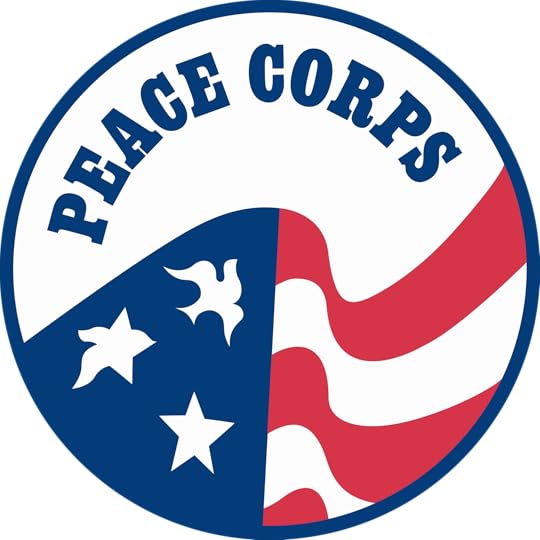
Last week, I wrote a summary of the charities I���m giving at least $25 apiece to this year. It went up on Friday morning, partly because of the Peace Corps section. I kept rewriting it and rewriting it, and I finally only bashed it into the approximate paragraph that���s there by taking the rest of the material and stuffing it in another document.
American friends and readers probably already have some idea of what the Peace Corps is and does. For my international friends, the Peace Corps is a program instituted by John F. Kennedy in 1961. The mission of the Peace Corps is to provide technical assistance and training to foreign lands that need them by sending volunteers abroad, to help other peoples learn about Americans and, just as important, help Americans learn about other peoples. The Peace Corps has its roots in older religious and progressive missions conducted by European countries ��� one proto-Peace Corps proposal even referred to Peace Corps Volunteers as ���missionaries of democracy.��� Volunteers live in and with the communities they serve (many are homestays) to plant gardens, dig wells, build roads, find financing, and develop community and economic relationships.
Kennedy���s announcement, in his um-er-ah Boston Brahmin brogue, puts it thusly: ���We will send Americans, men and women, who are qualified to do a job […] It will not be easy. None of the men and women will be paid a salary. They will live at the same level as the citizens of the country which they are sent to, doing the same work, eating the same foods, speaking the same language.��� He specified that the Peace Corps would put particular emphasis on ���those men and women who have skills in teaching, in agriculture, and in health.��� Not much has changed ��� there are now opportunities for Americans skilled in community organization, environmental protection, and business development as well,�� but everything else is as true today as it was in 1961.

So, why in Hell would I join? Why would anybody?
When I went to China the first time, it was 2006. Two years earlier, America collectively woke up after Voting Day to discover that not only did we elect George W. Bush again, but we���d doubled down on him and everything he stood for. It���s hard to express how utterly disillusioned and defeated the American left felt in those days. Media figures theorized that this marked the demise of the Democratic party, at long last. I remember watching V for Vendetta and being shocked and not a little relieved that I apparently wasn���t the only person left who felt dismayed by the whole apparatus of Homeland Security, the PATRIOT Act, military adventurism, an endless and fathomless War on Terror, and the smug assurance that neoconservatism was right, was sacred, and would endure forever.
I was a bitter and self-loathing American at 20. You can ask any of my old drinking mates in Asia.
But during my year there, I fell in love with China ��� with the night markets, the street food, the depth of meaning in the language. I also, much to my surprise, fell in love with America ��� with the gregariousness, the diversity, the cheese. I learned what it was to live with the chilling effect of censorship and to be a second-class citizen, not only to the Chinese but among foreigners as well (thanks to military adventurism and an endless and fathomless War on Terror).
I came away with a feeling that underneath all that were things worth upholding and celebrating ��� a national character that turns around and says hello while waiting in line and puts its scandals on the front page instead of hiding them in the back. Americans are weird, and I came around to loving them for it. And I felt the urge to serve my country, to honor the things it stands for and do what I could to make its people better ��� starting with myself.
My interests and talents skew international, but I felt that I would clash with the Armed Forces. I also feel that America���s interests and, more importantly, her morality and values are better served by exporting American generosity and pluck rather than American iron and lead.
Volunteers, when they return home, come back with a greater awareness and understanding of life outside our borders. Five years in China was educational, but I���ll be first to tell you that it���s only marginally prepared me for two years in Senegal. Returned Volunteers have unique experience and skills, in dealing with cross-cultural business, organization management, and inter-organizational cooperation, that their homebody contemporaries frankly can���t match. This is over and above job skills: medical Volunteers have had to deal with giving vaccinations for scarlet fever out of windswept canvas tents with only boiled water for sanitation. That kind of even keel and resourcefulness is something you want in your doctor.
Returned Volunteers get a laughably small stipend for relocation and may be able to afford a year of grad school afterwards, too. But that���s not the big reason ��� the real reason.
We, America, are the preponderant power in the world. Our battleships patrol the Malacca Straits and the Red Sea for pirates, our air support prevents use of chemical weapons. Our media plays a grotesque and distorted but ultimately recognizable self-image on screens from Russia to Rio. When we commit atrocities, everybody knows it ��� usually because we tell them.
We also come up with stuff like a United Nations for representatives of all countries to discuss their differences before resorting to armed conflict, like a space program to put a man on the Moon and return him safely to the Earth, like a government organization that sends people to foreign lands just to dig wells. Because they want to help.
That���s the kind of leadership, the kind of moral leadership, that America has glimmerings of in our best moments. Sometimes, we actually live up to the nobility and good-natured dignity that the American character is capable of. Establishing a constitutional democracy was good ��� opening the doors to the world���s poor and tired and huddled masses was better. Defeating Nazi Germany alongside our British, French, and Russian allies was good ��� the Marshall Plan that allowed all those countries to rebuild after the War was better.
Americans are weird, and wonderful, and sometimes even great.
If America is supposed to be the Leader of the Free World, if we even remotely deserve to be, it���s because of the kind of activities, values, and psychology that the Peace Corps embodies. The generosity with our talent and initiative, the innate friendliness and confidence, the desire and ability to lend a helping hand, the focus on individuals and communities over institutions and collectives. Above all, the hope and idealism that other nations have sneered at and that we now specialize in sneering at, ourselves. It���s those traits, more than anything else, that will make America genuinely worthy of being Leader of the Free World.
In other words, we could be The Americans.
—
Sidebar: A lot of my friends abroad seem to think that the Peace Corps is some kind of CIA plot, which I find frankly perplexing. You won���t find two organizations in Washington that hate each other more than the intelligence community and the Peace Corps, with the possible exception of the Democrats and Republicans. When I applied for the Peace Corps, they made it quite clear that I would be disqualified if I or any of my immediate family were involved with the CIA, FBI, or other alphabet-soup agencies, now, in the past, or in the next five years. Conversely, the Peace Corps is listed as a subversive organization (sandwiched between the American Communist Party and the Religious Society of Friends (Quakers)) if you try to join the intelligence community. The two groups have two very separate missions, and always avoid each other at parties.

January 30, 2015
Give
Charity is an intimate thing. It���s a clear declaration of your principles and your values, expressed in cold, hard cash. And if you happen to follow the man from Nazareth, or believe you do, it should be done in private and without fanfare. What charities you support, with sweat or gold, is as close and private as to leave you, essentially, naked.
And others are ready to judge you. Man, are they ever. If your charities (read, your values and principles) do not precisely align with theirs, they will look down on you for supporting undeserving causes rather than the noble and urgent causes that they support. I generally hear this in half-remembered rehashes of Alice Walker when I talk about space travel. ���How can we waste money on space exploration when people are starving in Africa?/when there���s human rights abuses in China?/when you could be contributing to the Democratic party?���

At which point, I’m usually thinking this.
So why talk about charity and about giving?
Because it is an expression of your values and principles. It���s one of the clearest indications of what you do value, what you consider important. And why you give to this cause (instead of others) is another indication. Because talking about an idea, writing it out, helps you to understand the idea ��� even if that idea is ���what I think is important.���
And because I���d like to get to know you. Not a grand reason, but a real one.
I won���t judge you for your choices (even if that choice is not to give anything to charity at all!), and anyone who does will feel the loving stroke of the banhammer. I do ask that you give your reasons, because reasons are interesting and help us all understand you better.
So, let���s get charitably intimate. I don���t mind starting. I compiled this list last year, and one of my resolutions is to donate at least $25 to each of these charities this year. I���m going to group these roughly in terms of self-interest going in ��� into expanding circles of empathy.
Rank Self-Interest:
These two organizations help others, but let���s be honest, I���m in it because I like fish and because I don���t want to die.
Familial Hypercholesterolemia Foundation ��� High cholesterol is a genetic trait in my family. Over the past forty years, anti-cholesterol drugs have been developed that make it possible for members of my family to live past fifty-five. The FHF continues to fund research into treating or even eliminating the spectre of early death and heart attacks that my bloodline has lived with since time immemorial. This is prudent self-interest.
San Luis Obispo Fresh Catch����� Seasonal local fish delivered weekly or biweekly? YES PLEASE. Admittedly, I love seafood to a fault. You can tell me all about mercury levels and the sustainability of farmed fish all you like, I will still happily suck down my Dungeness crab and my urchin. The Fish Cooperative keeps the local fishermen afloat, keeps Port San Luis and Morro Bay operating, and gets me cheap, affordable, local fish. What���s not to love?
Local Interest:
I grew up in the house my grandfather built, walking amongst the trees my grandfather planted, going to the library my grandmother started, attending the church they helped to found, with my mother feeding the hungry and my father keeping the local government squirming under the public eye. Charity may begin at home, but it���s in the local community where you can make the most impact. And I want to live up to the example of Miles Castle and Jean Bennett, of Steve Mathieu and Nancy Castle, of my uncle Roger Castle and of all the others who have made Morro Bay and San Luis Obispo a good place to live.
Morro Bay Friends of the Library ��� My grandmother was the first librarian in Morro Bay���s history. My mother has been a stalwart Friend of the Library since she was a girl. As a homeschooler, I was constantly in and out of the library as a boy and a young man. I know most of the librarians by name and they know me. Especially with this year���s library remodel, I want to uphold my family tradition and ensure that the library is there for anyone to check out a book from. Also, I run a publishing company ��� it���s enlightened self-interest.
Morro Bay Community Foundation ��� The Community Foundation administers the evening classes at the ��Community Center on Kennedy Way in Morro Bay. While I grew up, I took Taekwondo, fencing, and Uechi-ryu karate classes there (martial arts on Tuesdays and Thursdays, fencing Wednesdays). I could not have done so, and I could not have swordplay and the discipline of karate in my life, without scholarships from the Community Foundation. Let them benefit some other poor boy, so he can learn belly dance or iron body techniques whether his family is rich or poor. The Community Foundation allows children and adults to grow and develop as people, to drink deep of rich wells of expression and culture, whether they are rich or poor. They make the Estero Bay and its inhabitants better.
Morro Bay Harbor Festival ��� I���ve served on the Harbor Festival as Volunteer Coordinator, and my father has been a linchpin of the organization for nearly thirty years. The Harbor Festival, every first weekend in October, brings tens of thousands of people to Morro Bay and acts as a celebration of our maritime history and culture. Our merchants turn out to sell fish and jambalaya and arts and crafts and herbs and pictures. The Historical Society and the Friends of the Bay turn out to teach tourist and local alike. Bands play. And the Harbor Festival, bringing business and joy, asks only that you buy a glass of wine or a cup of beer. The Harbor Festival can always use donations to make next year���s bigger and better.
Central Coast Monthly Meeting (and the Education Fund thereof) ��� Central Coast Meeting is the Quaker Meeting that I attend. Effectively a Liberal Meeting, we have Friends of all theological and religious stances (and none), but worship in the traditional way: sitting in a circle, in waiting silence, quieting ourselves to hear the still, small voice within and to the voice of the Divine speaking through one of our Friends to the Meeting as a whole. All are welcome. Donations pay for rent at the Odd Fellows Hall, and donations to the Education Fund makes possible our Alternatives to Violence workshops, scholarships for Quaker youth, and a host of other educational activities.
St. Peter���s-by-the-Sea Episcopal Church ��� My grandfather, being a good Englishman, was Anglican, and when he built his house in Morro Bay, he quite sensibly went about organizing the same sort of church there (Episcopals are part of the greater Anglican communion). He was a key figure in the early history of St. Peter���s-by-the-Sea, and Mother now sits on the vestry, doing what she can to feed the homeless and working to make St. Peter���s-by-the-Sea a quiet power of Good in the community. Myself, I prefer the silence of Meeting, but I owe a debt to St. Peter���s-by-the-Sea and I am happy to pay it.
Cuesta College ��� I���m a big supporter of the California community college program. For a hundred or two hundred dollars a class (as opposed to thousands), a student can retrain in skills like nursing or welding, expand their horizons through art or music classes, or prepare for a university education by completing general education at far lower costs. I have many, many, many happy memories at Cuesta. But would it kill Cuesta to have one non-Indo-European language class?
Martial Arts:
I am a karateka. The martial arts have been a big part of my life and have moulded the better parts of my character. In the dojo I learned control, discipline, empathy, pacifism, service, and how to handle pain and defeat. In my arrogant rejection of martial practice, I learned humility and self-discipline and the difference between should and yearn for. And a well-executed sanchin kata is a thing of beauty, like a Miles Davis piece or a Gary Snyder poem. I want it to still be there for my children and for their children, and so on until there is a Mathieu on Free Mars settling into sanchin stance for their black belt testing.
Okikukai ��� Okikukai is the administrative body of Uechi-ryu karate. Uechi-ryu is a deeply conservative and traditional style of Okinawan karate, continuing to practice iron body methods and older, less sport-based versions of karate techniques (if you���re interested, compare and contrast boshi-ken in Uechi-ryu to the same technique in Isshin-ryu). A large part of this is because of how strict and tightly regulated Okikukai is ��� one does not simply collect a black belt in Uechi-ryu! I want Okikukai to continue and expand, to ensure a complete and clear transmission of the art of Uechi-ryu for generations to come.
International Aikido Federation ���I practice Uechi-ryu and some t���ai chi chuan, but if I had to recommend a martial art to someone, I���d recommend aikido. Aikido is a pacifist and practical art for solving self-defense problems, does not fall into the ���philosophy of winning��� trap, and is good exercise in the bargain. I would love to see a population where every single citizen is an aikidoka, and fully support IAF���s mission to educate the world in the do and jutsu, the philosophy and techniques, of aikido.
��
National Interest:
I have Feelings about America. This image gets pretty close to summing it up. And I support organizations that, in the words of Captain America, serve The Dream. Not the government, not any faction, not any person. Just the Dream. Organizations that serve our values and who we, as a people, aught to be. You may and I damn well hope you do disagree on the particulars, because that���s one of the things that make us us ��� we can disagree as citizens, and shake hands as friends, and through disagreement become better citizens and better friends.
The American Civil Liberties Union ��� Because I���m nothing if not polite, timid, and uncontroversial. Yeah, the ACLU loves them a nice high-profile case, and can zealously pursue them at the expense of equally deserving but less prestigious cases. But the ACLU is dedicated to preserving and maintaining individual rights and liberties, in the face of unjust governments, immoral corporations, and militant nonprofits. They also have this alarming tendency to be on the right side of history. The ACLU does good work, and I want them to keep doing so ��� even when it���s defending icky speech.
American Friends Service Committee ��� This is the activist arm of the Religious Society of Friends (the Quakers), and while I disagree with some of AFSC���s planks, I fully support their platform is upholding the traditional Quaker values and Testimonies. Having someone in Washington arguing for wacky ideas like religious tolerance, brotherly love, egalitarianism, and not going to war at the drop of a veil is a beautiful thing, over and above AFSC���s service projects both domestic and abroad.
The Peace Corps ��� The Peace Corps exists to bring Americans to the world and the world to Americans. Since 1961, Corps Volunteers have gone to the hungry and planted gardens, gone to the illiterate and built schools, gone to the thirsty and dug wells. And all we ask in return is friendship. Because, as our Canadian friends have noted, when the chips are down, you can and should expect the Americans to show up first. 2014 was a record-breaking year for Volunteer applications, and the Corps is expanding into more countries than ever before. If the ACLU defends who we Americans aught to be, and the AFSC reminds us who we aught to be, the Corps upholds who we aught to be. I will expand on my feelings of the Peace Corps in another post. I can only sum it up that the Corps makes me proud to be American, and I can think of no better way to serve my country and the world than as a Volunteer.
��
All of Humanity:
These people, in one way or another, have the entire world as their concern.
Red Cross ��� The Red Cross is first into disaster and war, bringing medical aid to the afflicted and help to the helpless. They also spread and maintain medical knowledge among the general population through their CPR and First Aid education programs. I haven���t needed the Red Cross yet (and God preserve me from ever doing so!), but I���d rather they were around if I did���or if anyone I know did.
Copenhagen Suborbitals ��� These Danish madmen are trying to crowdsource human spaceflight. And it���s working. Forget SpaceX, forget Musk, forget Dragon. If you want to see the future of human space, if you want to know who can find the most cost-effective way to put human beings in space and keep them there, it is here. What these men and women are doing today will put a Senegalese boy on a Low Earth Orbit platform in my daughter���s day, or her daughter���s ��� you mark my words.
Crowdsourced human spaceflight! YOU GUYS. THIS IS AWESOME.
Union of Concerned Scientists ��� The UCS wants to keep scientists (and the people who make scientific decisions, such as government employees) honest, and they want science to focus on helping humanity rather than developing new and terrible means of war. They exist as the intellectual heirs to Oppenheimer and Einstein, scientists who are wise and compassionate as well as intelligent. They protect whistleblowers and call out governments for manipulating science to suit political ends, they support renewable energy and truth in scientific research. If you have ever, ever, had concerns about scientific ethics or the morality of scientists, these are your people.
These, then, are my principles ��� the list may grow and change as I grow and change, but it won���t change very fast, and I don���t think it will change much at all. But how about you? Who do you give to? Who would you give to? And would you give $25 to them this year?


